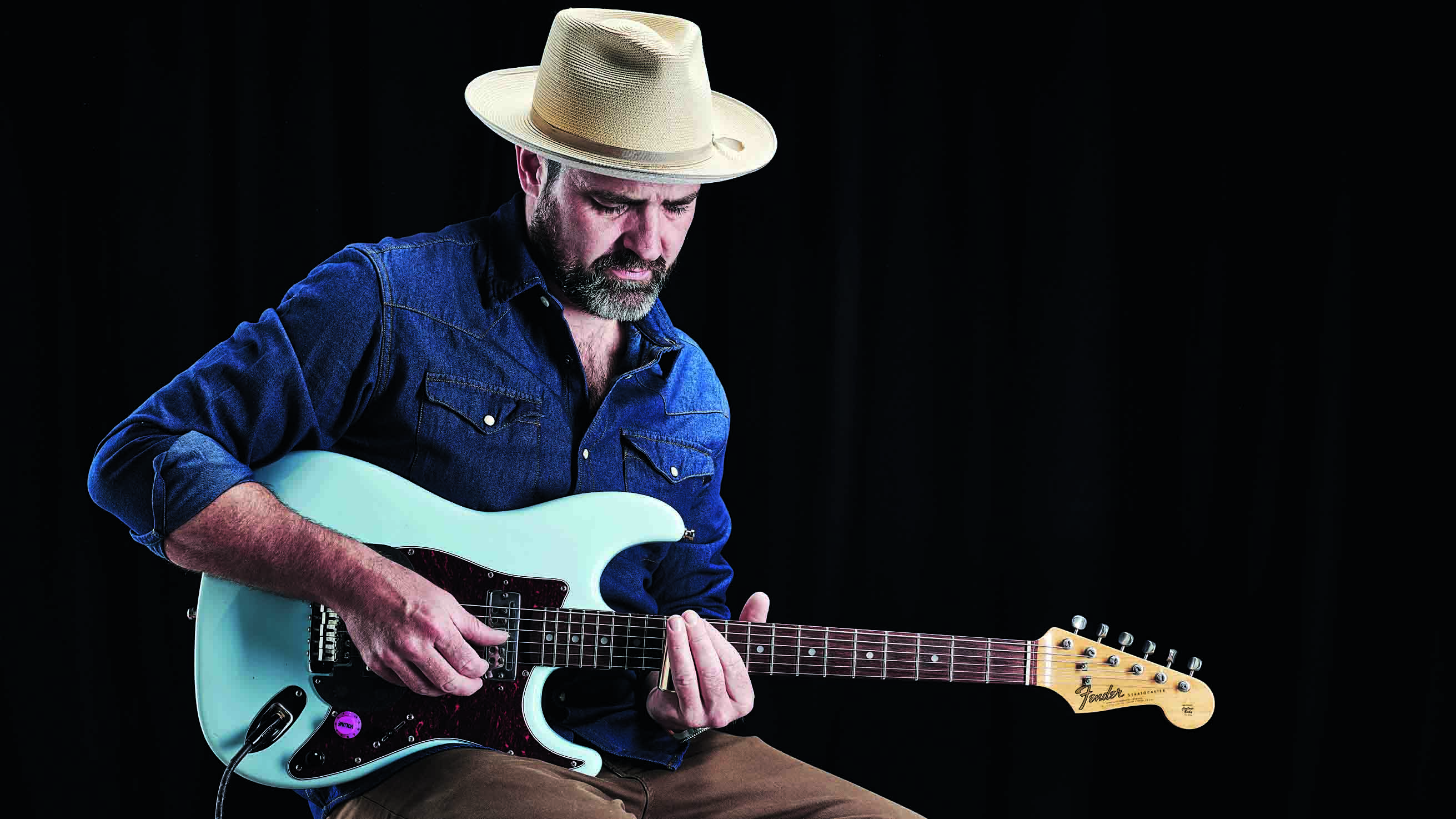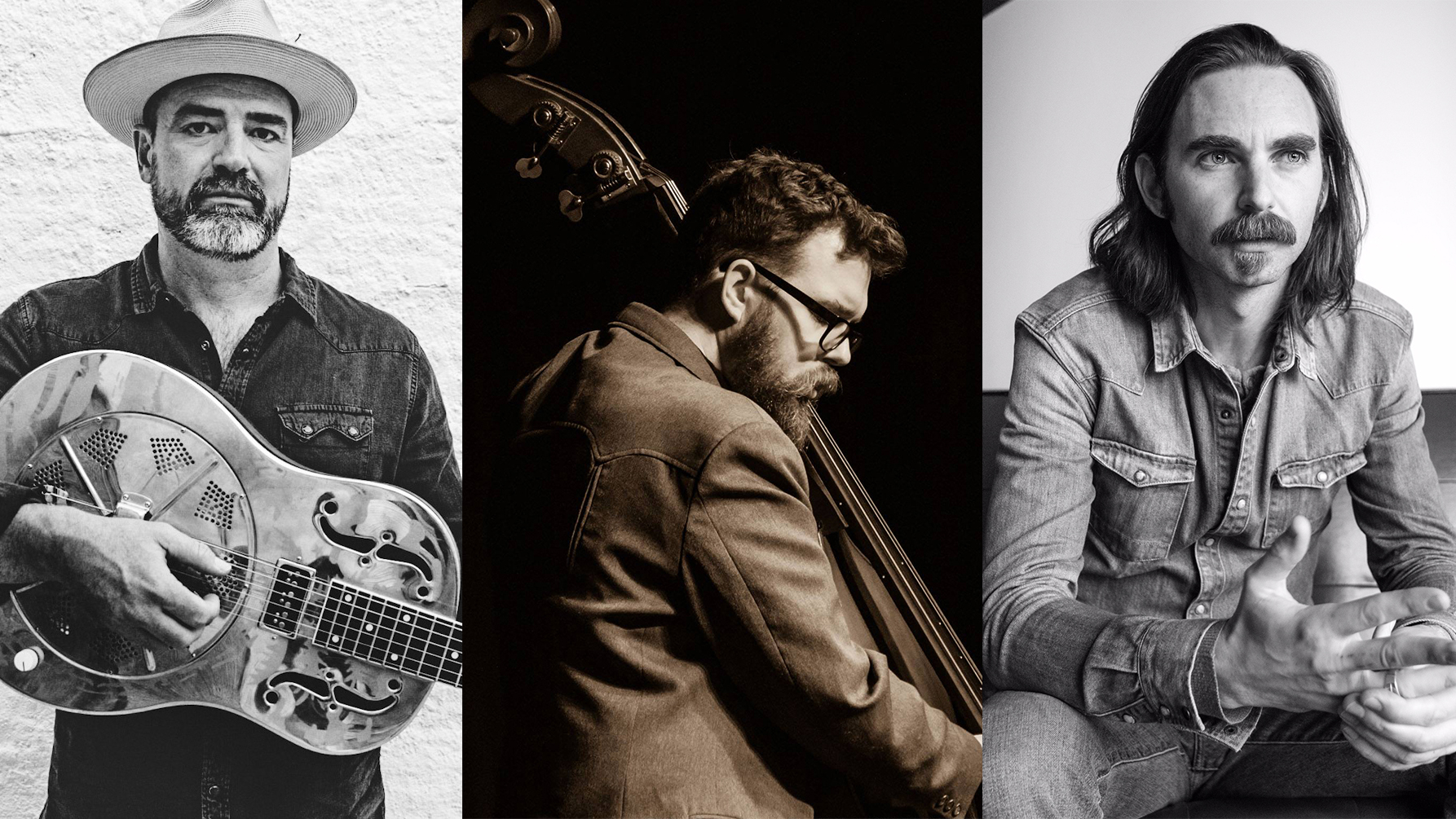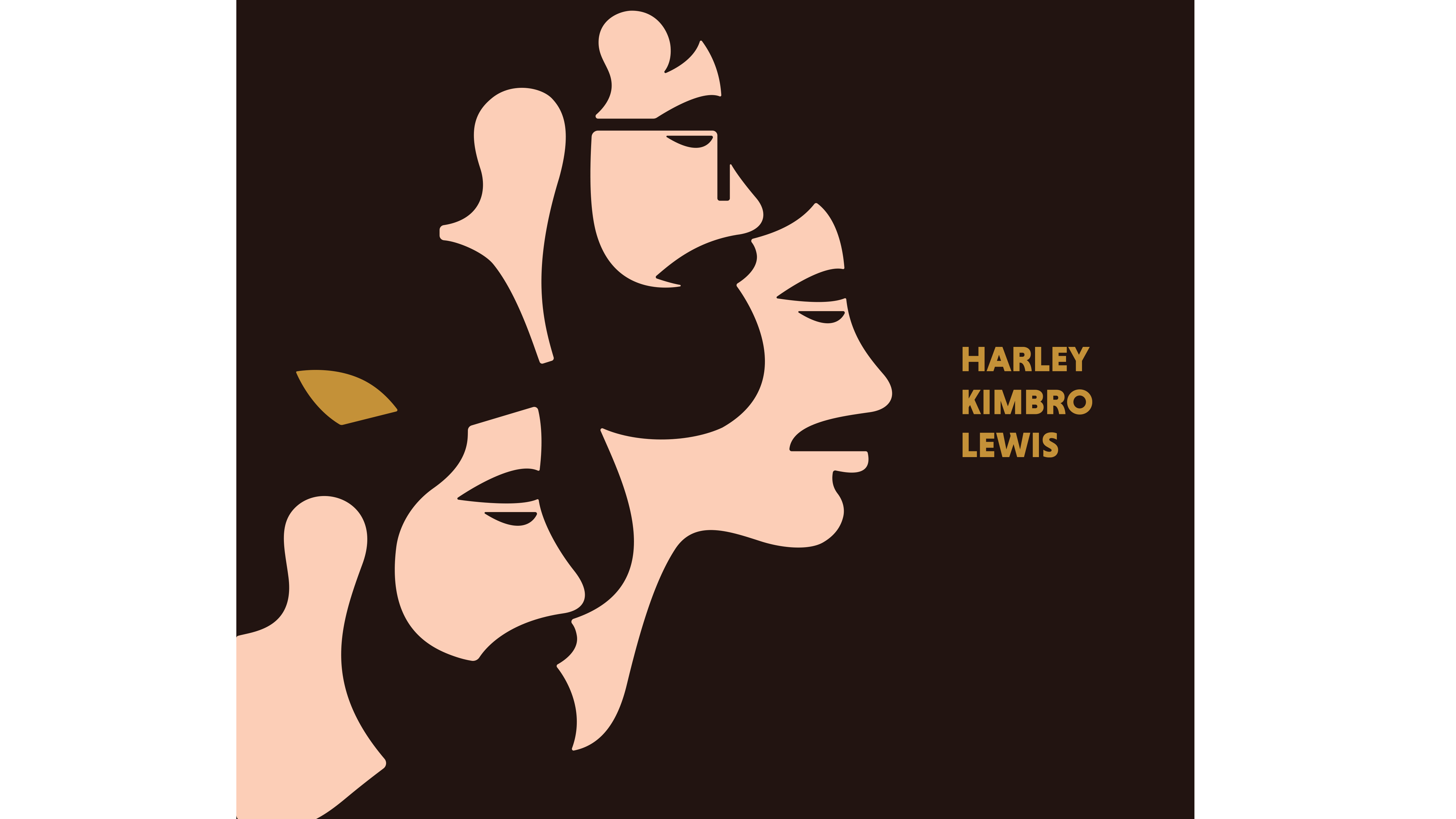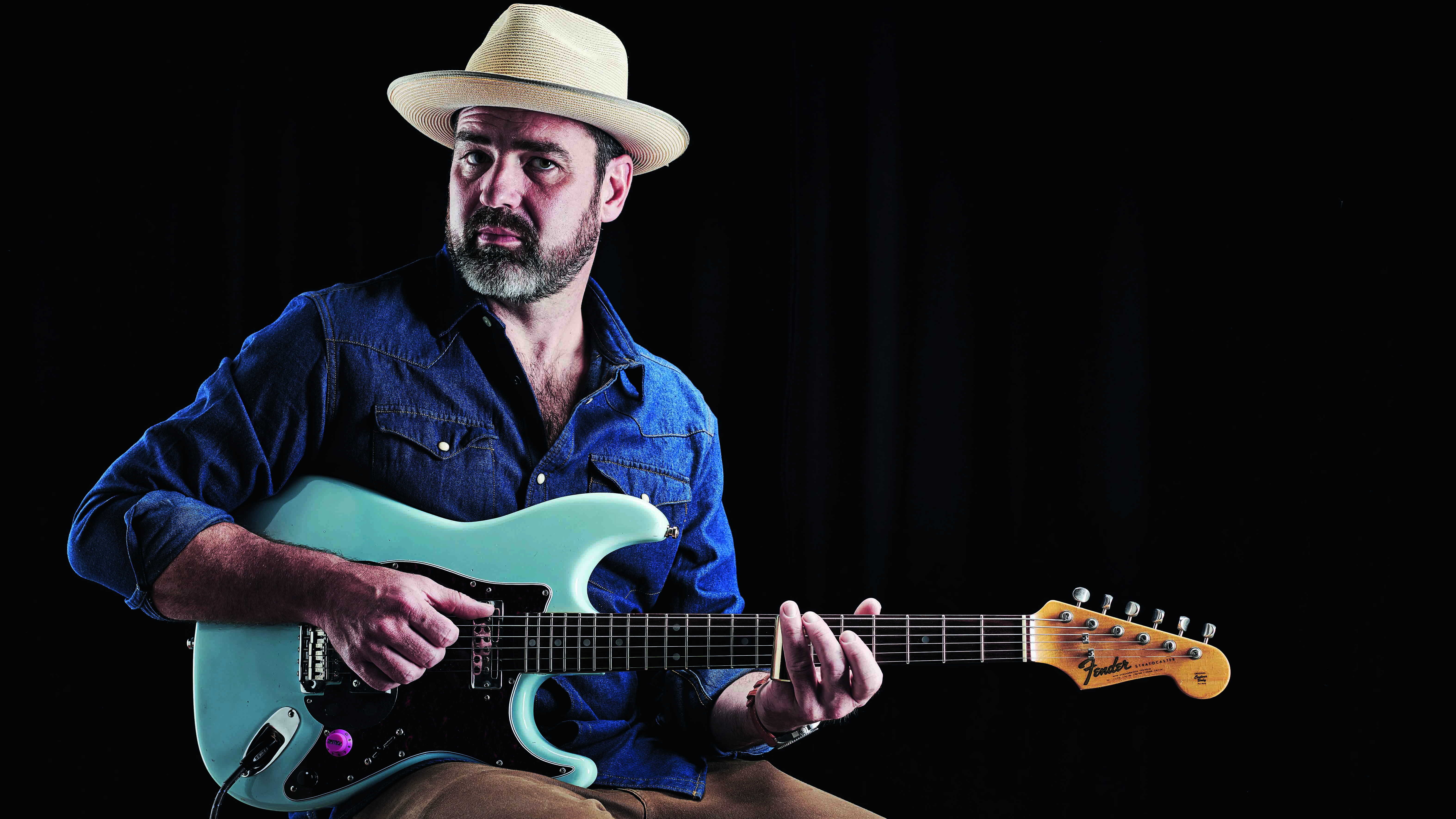"Great songs, and great blues songs can sound simple, but to get all the elements just right requires a deep understanding" – slide guitarist Martin Harley on the 5 blues albums that changed his life

Want all the hottest music and gear news, reviews, deals, features and more, direct to your inbox? Sign up here.
You are now subscribed
Your newsletter sign-up was successful
Martin Harley's formidable chops as a guitarist and singer-songwriter were made the old way; on the relentless road of touring up and down the UK and overseas to the reaches of the USA, Africa and even Everest Base Camp. The result is a rich blend of influence that reflects British folk and Americana, alongside world music but always rooted in the blues. It's made him one of the UK's finest roots musicians with Weissenborn slider a speciality. But sometimes his lifelong journey as a bluesman also leads him to find people that have a lasting impact on his music.
When I’m writing songs and need an unbiased opinion, I run it by Sam, and he does the same with me
One of those was Nashville bass player and instrumentalist Daniel Kimbro, who has already made two records with Martin and shared countless stages as a dynamic duo. Now they're adding a third amigo for a new trio album that's filled with expertly crafted Americana; the musician who brought them together in the first place.
"I was in Nashville in 2014 and feeling underwhelmed by the commercial side of town," Martin tells us of his fateful meeting with songwriter Sam Lewis. "A friend suggested that before leaving, I should rent a room for a couple of days on the east side of the city. I found a number on a coffee shop wall, and soon enough I found myself in the living room of Sam and his friend AJ's house. We had a great time hanging out drinking, eating and getting familiar with East Nashville." When Martin heard Sam's songwriting their musical connection began.
"After a couple of days Sam played me a couple of his songs that were staggeringly good. They had a timeless quality, as does his voice. We became great friends and have since embarked on numerous adventures together. When I’m writing songs and need an unbiased opinion, I run it by Sam, and he does the same with me. He introduced me to some incredible musicians who have altered the direction of my music and continue to do so in many positive ways. Daniel Kimbro was one of them."

Have you wanted to put the Harley Kimbro Lewis project together for a while?
"I’ve worked with Daniel on two albums before this one. It’s always been developmental, fun and rewarding. We've played in glorious concert halls as well as some real sh*t holes and seen both sides of the coin. We've wanted to make this album for the last five years.
"At first, busy touring schedules got in the way, then the pandemic. It feels great to have finally put this together. In a strange way the pandemic helped us slow cook these songs and really get everything feeling right before finishing the record. For that I am thankful. Pass the salt!"
Is this your first time collaborating with a second guitarist in writing songs?
Want all the hottest music and gear news, reviews, deals, features and more, direct to your inbox? Sign up here.
"No, I first collaborated with another guitar player, Jay Carter, while working on Drumrolls For Somersaults. We were, for the first time in my recording career, meticulous with pre production, relentlessly practicing guitar parts and harmonies. In this new project we all play guitar. There's no, "You do this, I do that". Sometimes Daniel would be in the control room farting about over the playback with a playing card stuck under the guitar string for percussive effect. We'd stop and say, 'Right let's use that.'"

The writing and tracking processes were close together on this record, how did that affect your approaches as a musician?
"Recording in such a lively way helps you to see the song as a whole and not to focus on just your own parts. There’s always a temptation to fix things these days, when in fact, it's better to leave the character in. It depends on what kind of record you're making of course, but personally I enjoy recordings where it sounds like there are people in a room making noise together."
Are you pretty good at being honest with each other?
"Yes, we all parked our egos on this album. If something sucked, I think we all knew it and moved on. We're honest with each other and I trust both Sam and Daniel's opinions. We don't all do the same thing, or play the same way, so it was fairly easy to find a place in the songs that felt natural. Above all it was a really good laugh and there was no pressure."
How would you describe the elements each of you brought to this project?
"Daniel can pull arrangements together quickly, he's a multi-instrumentalist, his harmonies are immediate and precise, perhaps because his day job is a side man to some of the best in the business, he brings speed without compromising anything else.
"Sam is a meditative and thoughtful songwriter, lyrically economical and laid back..... sometimes horizontal. He's not afraid to be surreal and is great at leaving it to the listener to make sense of what they're hearing. His voice is just killer. Listen to the vocal on Tokyo.
"I'm all about the guitars and having fun on this record. Joe McMahan (engineer and studio owner of Wow & Flutter) is a great guitarist with a wonderful selection of interesting guitars and amps. He might combine a '60s Princeton in the toilet with a Selmer in the hall and a pawn shop Strat to get the right sound. That environment was thoroughly enjoyable for me. I'm happy to pick up any guitar and try anything. Whatever works right?"
Are you planning on taking anything additional to your usual rig when you head out on tour with the other guys?
"Since the album is primarily acoustic, I'll be sticking with my trusty Andreas Cuntz Weissenborn, a '70s Martin D18 and the icing on the cake is my Patrick Eggle Coodercaster. I'm going small and beautiful in the amp department with a Swart Space Tone. Honestly, it's the best sounding amp I've ever owned. It's only 5 watts with and 8" ceramic speaker. Perfect for this project."
Moving on to your choice of albums, when did you first feel like you connected with the blues?
"I used to rent and copy cassette tapes from the library, picking albums based on their covers. Eventually, I found Little Milton, Freddie King, John Lee Hooker and later Robert Johnson. I couldn’t tell you exactly why I connected with that style of music. Perhaps I'm an escapist at heart, and the language of the blues was so wonderfully and wildly different from the world around me, it transported me. It was about connecting to a feeling, expressing raw emotion which was a potent cocktail in comparison to the squeaky clean 80's top 40 radio, which was all I'd really heard of music up to that point."
I like to think my take on the blues sits a little outside the box with its toes still in the water
What has kept you returning to it for inspiration and as a means to communicate musically?
"Great songs, and great blues songs can sound simple, but to get all the elements just right requires a deep understanding. I’m still a beginner and that’s the way I like it. I chose the journey because it’s a long one and to be able to to learn and grow throughout your profession is a real gift.
"Listen to any Taj Mahal record if you want to know how to master economy and intent, it seems effortless, but that guy is tapped into the very heart of it and his recipes are varied. Don't be afraid to splash some hot sauce on your eggs, you know? Don't stick to one style just because some folks liked that one album you made more than the others.
"I like to think my take on the blues sits a little outside the box with its toes still in the water. I’m not trying to appropriate a culture and I’m not trying to wear out old cliches. I just borrow a couple when I need them."

Martin Harley: 5 blues albums that changed my life
1. Freddie King - Getting Ready (1971)
"From the opening bars of Same Old Blues you know this album is going to be big, bold and hard to mess with. Produced by Leon Russell for his Shelter label and cut in the Chess Studio in Chicago, The energy of this 1971 recording is infectious. The distinctive mid-range of King's ES345 cuts through the band with wailing vibrato. His voice and guitar have all the light and shade you need to bring these songs soaring way up and back down to a whisper.
"Rumour is, Freddie liked to turn his fender quad reverb amps right up. You can hear it on Getting Ready. He toured relentlessly, often playing 300 shows a year and partying hard. He died at 42. Freddy king is frequently impersonated but never replicated. Highlight tracks for me are Key To The Highway' and the mighty Going Down. I could talk for a long time about the band on this album too, but as they say. 'Talking about music is like dancing about architecture'. Put this album on, turn it up. Enough said."
2. Kelly Joe Phelps - Shine-Eyed Mister Zen (1999)
If the blues is a musician searching their soul and sharing something deeply personal and introspective, then this is most definitely that
"Some folks won't think of this as a blues album, probably not even the man himself. Perhaps it's not, but I've always been fascinated by artists that combine genres and aren't afraid to improvise. If the blues is a musician searching their soul and sharing something deeply personal and introspective, then this is most definitely that.
"The intimacy of the recording certainly has the quality of an older blues recording, just one man in a room with a couple of microphones. There's blues, folk and country and gospel in here, but the forms are never rigid. Phelps improvises and alternates between regular guitar with numerous tunings and glorious lap slide, using nice warm big bodied Gibsons with the action raised way up, the perfect instrument for his deft, expressive style.
"The voice that he gives the slide guitar was arresting to me when I first heard it. There's nothing primitive about it, but there's nothing pretentious or showy either. This album had a prolific effect on the way I play guitar and how I perform live. His singing voice is just as honest, smokey, exciting and otherworldly as his guitar playing. Having seen numerous live shows, I can honestly say I've never heard him play the same song the same way twice. I believe it takes bravery to make music this personal. Katy is the first song I heard and I was hooked, his versions of the House Carpenter and Goodnight Irene are wonderful."
3. Snooks Eaglin - New Orleans Street Musician (1959)
Playing solo for at least half of my own shows, this is a great reminder of what can be accomplished by a single performer
"Snooks has got it all, including possibly the coolest name in blues history. He can sing like Ray Charles and makes classics like St James Infirmary sound fresh and exciting . His righthand has that perfect combination of loose, and absolutely on the money swing, there's some fine foot stomping too. The result is a solo artist greater than the sum of his parts (or limbs).
"It's frightening to think that Eaglin was only 22 when he made this acoustic record for the Smithsonain Folkways label in 1959. Having been playing out in electric bands since he was 12 years old, some criticised that choice, preferring the 'band' sound. I believe it showcases his prodigious talent and command of both song, and instrument.
"I chose this album because even though the song choices are eclectic, Eaglin puts his own unmistakable spin on every tune. The Lonesome Road is just under two minutes and aptly demonstrates Snooks's mesmerising combination of relaxed vocal delivery over sophisticated and metronomic guitar work. I never get tired of this record. Playing solo for at least half of my own shows, this is a great reminder of what can be accomplished by a single performer. No loops, no band, no fuss, no stress, and it sounds like not a drop of sweat was spilled."
4. Junior Kimbrough - First recordings (recorded 1966, released 2009)
"You can listen to this album in about the same amount of time it takes to make an omelette. The opening track Lonesome In My Home has some of the riffs you might recognise from the blues but the vocal melody is ethereal and haunting, almost like the desert blues from Mali.
"The lyrics to Meet Me In the City weave unpredictably through and across some of the most hypnotic guitar playing you're ever likely to hear. Kimbrough is a huge part of a blues genre called Mississippi Hill Country Blues which is characterised by a strong percussive element with the focus on groove as opposed to chord progressions. Hailing from the north of the state, close to the Tennessee border, the style was also played by the renowned RL burnside and Fred McDowell.
This album is a constant reminder that a great deal can be done with little or no chord changes
"Cedric Burnside, RL's nephew is out on the road keeping this style alive and strong, as are bands like the North Mississippi Allstars. This album is a constant reminder that a great deal can be done with little or no chord changes. What the right hand is doing might sound simple but it's extremely hard to get right. Give me another 30 years and I might get close. The Black Keys recorded an EP of JK's song back in 2005 which is well worth a spin."
5. Taj Mahal – Taj Mahal (1967)
"The beginning is a great place to start when it comes to Taj Mahal. His self-titled first album, recorded on Columbia records in 1967 features a young Ryland P Cooder, Jesse Ed Davis and Taj on guitar too. The harmonica on Leaving Trunk might be the most memorable opening to any blues song. The first few seconds will have you hooked as Tulsa drummer Chuck Blackwell drives the bus, and everyone stays right on board. (Chuck also plays on Freddie Kings Getting Ready).
"The songs of Blind Willie McTell, Sleep John Estes and Sonny Boy Williamson II get a reworking here, to the point I wonder if their authors would even recognise them. I love how Taj Mahal lifts signatures and totems from classic blues tunes, reimagining and transforming them into his own. Throughout his career Tay Mahal has remained engaging and relevant, exploring the roots of African, Jamaican, Afro-Caribbean and American music. He is quite simply, the man. A monument to love, built for comfort, not for speed."
The album Harley Kimbro Lewis is released on 22 February. The trio tour the UK in March:
6 Court Theatre, Tring
8 St David Hall, Cardiff
9 St George’s, Bristol
10 The Met, Bury
11 Stamford Art Centre
12 Otley Courthouse
14 Edinburgh Blues Club
15 Liverpool Philharmonic
16 The Ropewalk, Barton Upon Humber
18 St Marys, Shrewsbury
19 The Junction, Cambridge
22 Ropetackle Arts, Shoreham
24 Landmark Arts Centre, Teddington
25 The Old Bakery, Truro
26 Tivoli Theatre, Wimborne
For more info and tickets visit www.harleykimbrolewis.com
The 30 greatest blues guitarists of all time

Rob is the Reviews Editor for GuitarWorld.com and MusicRadar guitars, so spends most of his waking hours (and beyond) thinking about and trying the latest gear while making sure our reviews team is giving you thorough and honest tests of it. He's worked for guitar mags and sites as a writer and editor for nearly 20 years but still winces at the thought of restringing anything with a Floyd Rose.